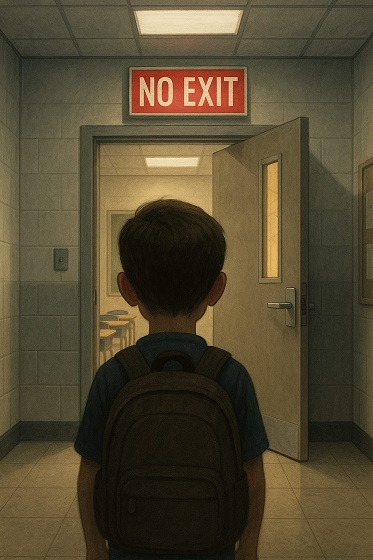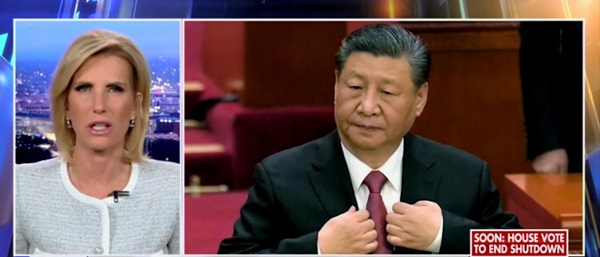Education
Canadian parents don’t want schools to push students into political activism

From the Fraser Institute
Field trips are often the highlight of a child’s school experience. But a recent “field trip” in downtown Toronto was memorable for all the wrong reasons, highlighting the disconnect between a government school board pushing kids into political activism and the strong parental preference that schools eschew political bias.
Last week, several schools in the Toronto District School Board (TDSB) sent their students to a day of action by the people of Grassy Narrows First Nation, ostensibly so students could listen to the speeches and learn about mercury contamination in rivers.
While the permission letter that went home to parents stated that students would not take part in the protest, video footage and eyewitness testimony tell a different story. And the protest morphed into geopolitical issue far from downtown Toronto. Not only were students encouraged to chant anti-Israel slogans such as “From Turtle Island to Palestine, occupation is a crime,” but pictures from the event show students carrying handmade protest signs amid a heavy police presence.
Children as young as eight participated. No matter what one thinks about the current Israel/Hamas conflict, most people agree that eight-year-old kids are not old enough to comprehend the complex issues behind it. At the very least, they should not be coopted into a political protest, especially something so potentially volatile it requires a heavy police presence.
When the TDSB apologized, the vice-president of the Elementary Teachers of Toronto union local said the apology was racist, amounted to the board not standing with teachers and children, and said the organizations that expressed concern (namely, the Centre for Israel and Jewish Affairs and the Friends of Simon Wiesenthal Center) were “spying on our children.”
Perhaps inconveniently for some, “our children” in this case belong to their parents, and those parents did not provide informed consent. Ontario Education Minister Jill Dunlop has ordered an investigation into the field trip. But clearly, by allowing its schools to participate, the TDSB has demonstrated once again that it has lost sight of what should be the primary focus of every school—teaching and learning.
Students attend school to learn how to read, write and do math. They should also learn about the history of our country, form good character and civic responsibility, develop an understanding of science, and gain an appreciation for music and art. These are things that all parents, regardless of political affiliation, can agree upon.
The moment any government public school departs from these common goals, they risk losing the trust of parents.
Indeed, a 2024 Leger poll (commissioned by the Fraser Institute) found that 76 per cent of parents of K-12 kids in Canada believe students should hear both sides of controversial issues, or they should be avoided entirely.
Another 91 per cent of parents believe classroom material and discussions should always be age-appropriate, and 81 per cent believe schools should provide advance notice if controversial topics are discussed during class or formal school activities.
In this case, the TDSB field trip respected none of these strong parental preferences.
Of course, if students or families wish to get involved in protests on their own time, that’s perfectly fine. And students should be allowed to write about the Middle East conflict for their English essay assignments and talk about these issues in class, so long as teachers ensure that the discussion remains balanced and parents receive a heads-up.
Finally, this fiasco underscores the importance of school choice. In Ontario, no portion of parents’ tax dollars follow their kids to the school of their choice, unlike in other provinces including Manitoba where independent schools are more accessible to families of all income levels. If Ontario families can’t afford full tuition at an independent school, their kids likely attend the local government public school, like those within the TDSB.
If the Ontario government helped fund independent schools, more families could afford them and those independent schools would be accountable to those families. And with increased competition for students, TDSB administrators might listen more to parental concerns about political bias.
Canadian parents are right—no school should ever push students into political activism. Education must be about academics, not activism.
Author:
Alberta
When Teachers Say Your Child Has Nowhere Else to Go

When educators argue that children who don’t fit their system should have nowhere else to go, you’re witnessing institutional self-interest dressed up as social justice.
A petition is making its way through Alberta that could fundamentally reshape education in the province, and not for the better. The “Alberta Funds Public Schools” initiative, launched by Calgary high school teacher Alicia Taylor, asks a deceptively simple question: “Should the Government of Alberta end its current practice of allocating public funds to accredited independent (private) schools?”
Taylor isn’t just any teacher. She’s a Calgary district representative on the Alberta Teachers’ Association’s governing council. And while the ATA has been careful to maintain that this is Taylor’s personal initiative, they’ve conspicuously failed to repudiate it. In fact, ATA president Jason Schilling has publicly stated that members “take exception” to public dollars going to private schools, while simultaneously claiming the association’s policy isn’t “against private schools.” This is the kind of rhetorical contorsions that deserves scrutiny.
The timing is telling. The petition was approved just as 51,000 Alberta teachers launched the province’s first-ever province-wide strike. Taylor called this “a happy accident,” noting that striking teachers now have “a little more spare time than normal” to collect signatures. When your “personal initiative” coincidentally launches during a labor action and benefits from union members’ sudden availability, reasonable people might wonder how personal it really is.
To be fair, let’s present the strongest version of the argument Taylor and her supporters are making. They claim that Alberta spends the least per student in Canada on public education while funding private schools at 70%, the highest rate in the country. This creates what they see as a perverse incentive structure: public money flowing to selective institutions while universal public schools struggle with overcrowding and teacher shortages.
The math seems straightforward: $461 million currently goes to independent schools serving about 50,000 students. Redirect that money to the public system serving over 600,000 students, and you could fund thousands of teachers and educational assistants. You could reduce class sizes. You could provide more support for struggling students.
They argue this is about fairness and democratic accountability. Taxpayers fund education for the common good, and that investment should go to schools that must accept every student, not selective alternatives that can charge tuition on top of public subsidies. Private schools exist and thrive in Ontario without public funding. Why should Alberta be different?
Moreover, they contend, the current system subsidizes exit from the public system, creating a vicious cycle where families with resources opt out, taking their advocacy and engagement with them, leaving behind an increasingly residualized public system serving the most vulnerable students.
Underlying much of this argument is a class-based resentment: the notion that some families can access alternatives amounts to unfair privilege. This framing reveals more about the advocates than about education policy. Envy is never a good look in educators. When teachers’ unions frame educational choice as a problem because some families have options others don’t, they’re not arguing for equity. They’re arguing for enforced equality of limitation, where if not everyone can have something, no one should.
It sounds compelling. It’s also dangerously wrong.
Let’s start with the most fundamental flaw in this argument: taking the money doesn’t make the students disappear. Nearly 50,000 students attend independent schools in Alberta, plus another 8,000 in private early childhood programs. These children don’t vanish if funding is eliminated. They flood into a public system that petition supporters themselves admit is already overcrowded. The math is straightforward: forcing these students back into public schools would cost taxpayers an additional $300 million, more than the government’s most recent settlement offer to teachers. This is about forcing conformity at massive cost, while improving nothing.
But the financial argument, while important, pales beside the human cost. Consider what this petition really proposes: eliminating educational options for approximately 80% of independent school families whose income is at or below the provincial average. These aren’t wealthy elites. They’re middle-income families making sacrifices to access education that works for their children.
The class warfare rhetoric of the petition obscures this reality. When advocates frame school choice as privilege, they ignore that Alberta’s funding model specifically makes choice accessible to families who couldn’t otherwise afford it. Eliminating this doesn’t level the playing field. It simply ensures that only the truly wealthy retain educational options.
Here’s what makes this proposal particularly egregious: its devastating impact on neurodiverse learners. Many of the fastest-growing independent schools in Alberta serve students with special learning needs. These are children who struggled, or failed, in standard public school classrooms. They’re students with ADHD who need smaller classes and more movement. They’re autistic students who thrive with structured routines and specialized approaches. They’re kids with dyslexia who need intensive, systematic literacy intervention that their public school couldn’t provide.
The petition’s supporters blithely suggest these students should return to the very system that couldn’t serve them. When teachers are striking over classroom complexity and overcrowding, the proposed solution is to add tens of thousands more students, many with intensive needs, to those same classrooms. This is illogical and cruel.
The ATA argues that a “well-funded public system should be meeting the needs of those kids in the first place.” Should. That’s doing a lot of work in that sentence. Yes, the public system *should* meet every child’s needs. But it doesn’t. And there’s no evidence that simply throwing more money at the problem will change that.
Whatever challenges Alberta’s public schools face, it’s naive and simplistic to believe more money will fix them. There is no study in the world that connects higher teacher wages with better educational outcomes. The problems in public education are complex, structural, and often resistant to solutions that amount to “spend more.”
Neurodiverse students aren’t one-size-fits-all. A student who thrives in a Montessori environment with hands-on learning and self-directed exploration might struggle in a traditional classroom. A student who needs the structure and explicit instruction of a classical education might flounder with inquiry-based learning. An autistic student might do brilliantly in a small school with consistent routines and sensory-aware design, but melt down daily in a crowded comprehensive school.
Eliminating funding for independent schools eliminates options, period. It tells families: your child must fit into our system, or fail. For neurodiverse learners, this is often a sentence to years of struggle, frustration, and educational failure.
But this goes beyond neurodiversity. It’s about every kind of educational diversity. Alberta’s independent schools include French immersion programs, Indigenous-focused schools, classical academies, arts-intensive programs, schools with specific pedagogical approaches, faith-based education reflecting diverse religious traditions, and schools serving new Canadian communities with specific cultural and linguistic needs.
This is educational pluralism: the recognition that in a diverse democracy, different families have different values, different children have different needs, and no single approach serves everyone well. The ATA’s position, however much they try to obscure it, is that this diversity is a problem to be solved. That public money should only support one kind of school: the government-run, union-staffed, standardized public school. Every other option should be available. if at all, only to families wealthy enough to afford full-freight tuition.
This entrenches inequality rather than reducing it. Right now, Alberta’s funding model democratizes choice. A middle-income family whose child isn’t thriving in public school has options. Eliminate public funding, and those options exist only for the wealthy. The result is a rigid two-tier system where the rich can escape and everyone else is trapped.
The envious framing of the ATA’s position becomes clearer here. They see that some families can access alternatives and conclude the problem is the alternatives, not the lack of universal access. This is the logic of enforced mediocrity: if we can’t give everyone excellent options, we’ll eliminate the excellent options that exist. It’s a race to the bottom masquerading as equity.
Let’s be honest about what’s really happening here. The ATA represents teachers in public schools. It has no role in independent schools. Every student in an independent school is a student in a classroom where the union has no power, no collective bargaining rights, and no ability to call strikes that disrupt families.
When Taylor notes that families with children in independent schools experienced “business as usual” during the strike while public school families scrambled for childcare, she’s unwittingly making the case against her own position. Educational diversity means resilience. It means not every family is held hostage to a single system’s labor disputes.
The union has an institutional interest in maximizing enrollment in schools where it holds power. This petition advances that interest. That’s no coincidence. The careful distance the ATA maintains (“It’s not our petition, but we agree with its goals”) is transparent political cover.
Here’s the assumption underlying this entire petition: if we eliminate alternatives and force all students into the public system, somehow that system will improve. This is supremely naive. Suppressing educational variety and choice won’t improve the ails of the public system. It will simply trap more students in whatever problems already exist. If public schools are struggling with classroom management, adding students who left won’t help. If they’re struggling with diverse learning needs, adding students with intensive special needs won’t help. If they’re struggling with overcrowding, adding 50,000 more students certainly won’t help.
The theory seems to be that if we eliminate choice, the system will be forced to improve to meet everyone’s needs. But that’s not how monopolies work. When you have captive customers with no alternatives, the pressure to improve actually decreases. Competition, choice, and the possibility of exit are what create pressure for systems to innovate and serve their clients well.
Educational diversity makes everyone better off. It provides options for students who struggle in traditional settings. It allows innovation and experimentation. It respects that families have different values and priorities. It creates competitive pressure that benefits all schools. And it even costs taxpayers less because families contribute tuition on top of partial public funding.
The Taylor petition claims to be about fairness and adequate resources. In reality, it’s about control and conformity. It would devastate neurodiverse learners, reduce educational variety, eliminate options for middle-income families, and force tens of thousands of students into an already overcrowded system, all while costing taxpayers hundreds of millions more.
And for what? The promise that somehow, magically, removing alternatives will make the remaining system better? That’s wishful thinking dressed up as education policy.
The ATA may not have officially endorsed this petition, but they haven’t repudiated it either. Their silence is instructing, considering that no one would benefit most from the success of such petition than the ATA. And Alberta families, especially those with children who learn differently, should pay attention to what that silence means for their future choices.
When Taylor launched this petition as a “Calgary district representative on the Alberta Teachers’ Association’s governing council,” whatever the pretense of privacy, she wasn’t acting in a vacuum. When the ATA president publicly supports the petition’s goals while maintaining plausible deniability about its origin, that’s a political strategy. When striking teachers use their “spare time” to collect signatures for a petition that would eliminate non-union schools, that’s campaign coordination.
The envious rhetoric about “privilege” and “fairness” obscures what this petition does. It doesn’t help struggling students. It doesn’t improve public education. It doesn’t create equity. It eliminates options for middle-income families. It’s the worst kind of class politics: making everyone worse off in the name of equality.
Educational diversity is a necessity for a functioning pluralistic society. It’s essential for neurodiverse learners who don’t fit the standard mold. It’s crucial for families who want education that reflects their values. And it’s fundamental to the idea that parents, not government bureaucrats or union officials, should have the primary say in their children’s education.
Any proposal to eliminate educational diversity, whatever its rhetorical packaging, deserves to fail. And Albertans should see this petition for what it truly is: an institutional power play to eliminate competition and force conformity, motivated more by envy than by any genuine concern for educational outcomes.
The stakes are high. Educational freedom, once lost, is extraordinarily difficult to regain. When educators tell you that children who don’t fit their system should have nowhere else to go, believe them. Then fight back. Alberta families should resist this petition with everything they have.
For the full experience, and to help us bring you more quality research and commentary,
please upgrade your subscription.
Alberta
School defunding petition in Alberta is a warning to parents

This article supplied by Troy Media.
A union-backed petition to defund independent schools in Alberta could trigger a wave of education rollbacks across Canada
A push to defund independent schools in Alberta is a warning to every Canadian parent who values educational options.
A petition backed by the Alberta teachers’ union may be the first step toward reduced learning choices across Canada. Independent schools, most of them non-elite and often focused on a specific pedagogical approach, receive partial public funding in Alberta and serve diverse student populations.
The petition, launched under Alberta’s citizen initiative law, could trigger a provincewide referendum if it meets the required threshold set by provincial election law.
If your child isn’t in a standard public classroom, whether they’re home-schooled, in a charter, Francophone, Catholic, or
specialized public program, this petition puts your educational decisions at risk.
Opponents of choices in education have been forthright in their attempts to erode the large and successful range of learning options that most Canadians enjoy. Instead, they seem to be aiming for a single, uniform, one-size-fits-all system with no variation for children’s many learning styles and needs, nor for new teaching innovations.
During last year’s NDP leadership campaign in Alberta, candidate (and current MLA) Sarah Hoffman proposed effectively eliminating charter schools and forcing them to join public school boards.
The current recall effort targeting Alberta Education Minister Demetrios Nicolaides lists “charter-private school” funding as a rationale. There is no such thing as a charter-private school, since charter schools are public and 100 per cent provincially funded.
It’s clear the petition is aimed at restricting or defunding charter schools despite their popularity. More than 15,000 students are enrolled and over 20,000 more are on wait-lists in Alberta.
Alberta isn’t the only place where schooling options are coming under pressure. Yukon’s NDP leader has called for defunding and eliminating the territory’s entire Catholic separate system. Similar arguments exist in Ontario. British Columbia doesn’t have a Catholic school system. Newfoundland had one, but in 1998 merged the Catholic board into the public one.
Going as far back as 2010, provinces including Newfoundland, British Columbia, P.E.I. and Nova Scotia have sought to justify limiting the Francophone schooling options they offer due to high costs and budget limitations.
These provincial actions raise a larger question. Efforts to defund Catholic and Francophone schooling are striking, given that both are constitutionally protected. If, as teachers’ unions argue, even constitutionally protected choices can be defunded, restricted or eliminated, how safe are all the other options, like independent, charter, or microschools that aren’t written into the constitution but excel at producing well-formed, knowledgeable graduates ready for adulthood?
Even specialized programs offered within the public system aren’t safe. Last year, the Calgary Board of Education shut down its all-boys program, saying the space was needed to accommodate general enrolment growth. However, the building was then leased out to a post-secondary institution. In Vancouver, the public board stopped new enrolment in its gifted student program, ending “the only publicly funded option for kids who need an accelerated learning environment.”
If these formal attacks on educational diversity can happen in Alberta, which has long been Canada’s leader in making a wide variety of learning options available, affordable and accessible to families, then it certainly can happen in other provinces as well.
The Saskatchewan Teachers’ Federation has already asked the government to end funding for independent schools. A similar push has surfaced in British Columbia. The claim that independent schools drain resources from the public system is incorrect. Every student who enrolls in an independent school costs the provincial budget less and frees up space, teaching time, and other public school resources for everyone else.
These efforts reflect a zero-sum view of education and a false view that only some schools serve the common good.
A better approach is to expand what’s available. Provinces can support more learning options for families, which means more resources and better results for students, no matter how or where they learn.
We need to pay attention to what’s happening in Alberta and elsewhere. Parents don’t want fewer options to help their children enjoy school and flourish academically or personally. If educational diversity can be rolled back in Alberta, it can be rolled back anywhere.
Canadians who value educational alternatives need to pay attention now—before the decisions are made for them.
Catharine Kavanagh is western stakeholder director at Cardus, a non-partisan thinktank that researches education, work and public life.
Troy Media empowers Canadian community news outlets by providing independent, insightful analysis and commentary. Our mission is to support local media in helping Canadians stay informed and engaged by delivering reliable content that strengthens community connections and deepens understanding across the country
-

 Crime2 days ago
Crime2 days agoCBSA Bust Uncovers Mexican Cartel Network in Montreal High-Rise, Moving Hundreds Across Canada-U.S. Border
-

 Alberta1 day ago
Alberta1 day agoMark Carney Has Failed to Make Use of the Powerful Tools at His Disposal to Get Oil Pipelines Built
-

 Daily Caller11 hours ago
Daily Caller11 hours agoLaura Ingraham’s Viral Clash With Trump Prompts Her To Tell Real Reasons China Sends Students To US
-

 MAiD1 day ago
MAiD1 day agoQuebec has the highest euthanasia rate in the world at 7.4% of total deaths
-

 Business1 day ago
Business1 day agoCarney shrugs off debt problem with more borrowing
-

 Automotive1 day ago
Automotive1 day agoThe high price of green virtue
-

 Bruce Dowbiggin23 hours ago
Bruce Dowbiggin23 hours agoMaintenance Mania: Since When Did Pro Athletes Get So Fragile?
-

 Environment2 days ago
Environment2 days agoThe Myths We’re Told About Climate Change | Michael Shellenberger














